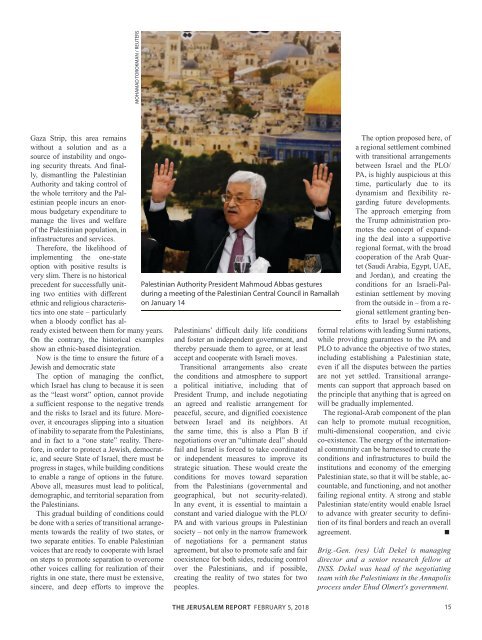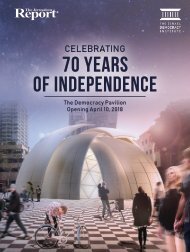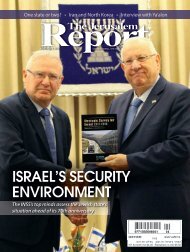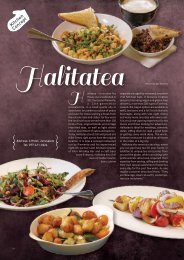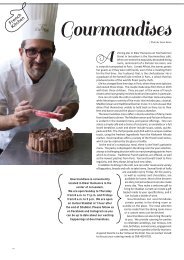All small
You also want an ePaper? Increase the reach of your titles
YUMPU automatically turns print PDFs into web optimized ePapers that Google loves.
MOHAMAD TOROKMAN / REUTERS<br />
Gaza Strip, this area remains<br />
without a solution and as a<br />
source of instability and ongoing<br />
security threats. And finally,<br />
dismantling the Palestinian<br />
Authority and taking control of<br />
the whole territory and the Palestinian<br />
people incurs an enormous<br />
budgetary expenditure to<br />
manage the lives and welfare<br />
of the Palestinian population, in<br />
infrastructures and services.<br />
Therefore, the likelihood of<br />
implementing the one-state<br />
option with positive results is<br />
very slim. There is no historical<br />
precedent for successfully uniting<br />
two entities with different<br />
ethnic and religious characteristics<br />
into one state – particularly<br />
when a bloody conflict has already<br />
existed between them for many years.<br />
On the contrary, the historical examples<br />
show an ethnic-based disintegration.<br />
Now is the time to ensure the future of a<br />
Jewish and democratic state<br />
The option of managing the conflict,<br />
which Israel has clung to because it is seen<br />
as the “least worst” option, cannot provide<br />
a sufficient response to the negative trends<br />
and the risks to Israel and its future. Moreover,<br />
it encourages slipping into a situation<br />
of inability to separate from the Palestinians,<br />
and in fact to a “one state” reality. Therefore,<br />
in order to protect a Jewish, democratic,<br />
and secure State of Israel, there must be<br />
progress in stages, while building conditions<br />
to enable a range of options in the future.<br />
Above all, measures must lead to political,<br />
demographic, and territorial separation from<br />
the Palestinians.<br />
This gradual building of conditions could<br />
be done with a series of transitional arrangements<br />
towards the reality of two states, or<br />
two separate entities. To enable Palestinian<br />
voices that are ready to cooperate with Israel<br />
on steps to promote separation to overcome<br />
other voices calling for realization of their<br />
rights in one state, there must be extensive,<br />
sincere, and deep efforts to improve the<br />
Palestinian Authority President Mahmoud Abbas gestures<br />
during a meeting of the Palestinian Central Council in Ramallah<br />
on January 14<br />
Palestinians’ difficult daily life conditions<br />
and foster an independent government, and<br />
thereby persuade them to agree, or at least<br />
accept and cooperate with Israeli moves.<br />
Transitional arrangements also create<br />
the conditions and atmosphere to support<br />
a political initiative, including that of<br />
President Trump, and include negotiating<br />
an agreed and realistic arrangement for<br />
peaceful, secure, and dignified coexistence<br />
between Israel and its neighbors. At<br />
the same time, this is also a Plan B if<br />
negotiations over an “ultimate deal” should<br />
fail and Israel is forced to take coordinated<br />
or independent measures to improve its<br />
strategic situation. These would create the<br />
conditions for moves toward separation<br />
from the Palestinians (governmental and<br />
geographical, but not security-related).<br />
In any event, it is essential to maintain a<br />
constant and varied dialogue with the PLO/<br />
PA and with various groups in Palestinian<br />
society – not only in the narrow framework<br />
of negotiations for a permanent status<br />
agreement, but also to promote safe and fair<br />
coexistence for both sides, reducing control<br />
over the Palestinians, and if possible,<br />
creating the reality of two states for two<br />
peoples.<br />
The option proposed here, of<br />
a regional settlement combined<br />
with transitional arrangements<br />
between Israel and the PLO/<br />
PA, is highly auspicious at this<br />
time, particularly due to its<br />
dynamism and flexibility regarding<br />
future developments.<br />
The approach emerging from<br />
the Trump administration promotes<br />
the concept of expanding<br />
the deal into a supportive<br />
regional format, with the broad<br />
cooperation of the Arab Quartet<br />
(Saudi Arabia, Egypt, UAE,<br />
and Jordan), and creating the<br />
conditions for an Israeli-Palestinian<br />
settlement by moving<br />
from the outside in – from a regional<br />
settlement granting benefits<br />
to Israel by establishing<br />
formal relations with leading Sunni nations,<br />
while providing guarantees to the PA and<br />
PLO to advance the objective of two states,<br />
including establishing a Palestinian state,<br />
even if all the disputes between the parties<br />
are not yet settled. Transitional arrangements<br />
can support that approach based on<br />
the principle that anything that is agreed on<br />
will be gradually implemented.<br />
The regional-Arab component of the plan<br />
can help to promote mutual recognition,<br />
multi-dimensional cooperation, and civic<br />
co-existence. The energy of the international<br />
community can be harnessed to create the<br />
conditions and infrastructures to build the<br />
institutions and economy of the emerging<br />
Palestinian state, so that it will be stable, accountable,<br />
and functioning, and not another<br />
failing regional entity. A strong and stable<br />
Palestinian state/entity would enable Israel<br />
to advance with greater security to definition<br />
of its final borders and reach an overall<br />
agreement. <br />
Brig.-Gen. (res) Udi Dekel is managing<br />
director and a senior research fellow at<br />
INSS. Dekel was head of the negotiating<br />
team with the Palestinians in the Annapolis<br />
process under Ehud Olmert's government.<br />
THE JERUSALEM REPORT FEBRUARY 5, 2018 15


